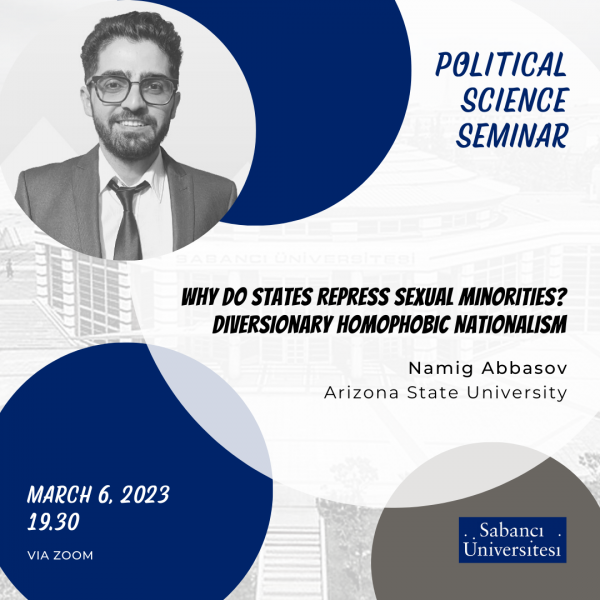Political Science Seminar, Namig Abbasov
Short Bio
Namig Abbasov received his Ph.D. degree in Political Science from the School of Politics and Global Studies at Arizona State University in December 2022. He also holds a MA in International Relations and Dialogue Studies from Keele University, the United Kingdom, and a BA in Regional Studies and Economic Sciences from Baku Engineering University (former Qafqaz University), Azerbaijan. His research areas are authoritarian politics and democratization, human rights and state repression, political violence, conflict, international and environmental security, global governance, and International Political Economy with a regional focus on broader Eurasian politics. His research employs both qualitative and quantitative methods and has been published in Foreign Policy Analysis, Problems of Post-Communism, Asia-Europe Journal, Caucasus Survey, and Middle East Policy.
Why Do States Repress Sexual Minorities? Diversionary Homophobic Nationalism
Why do states repress sexual minorities? The logic of coercive responsiveness demonstrates that states repress people when they feel threatened. From this perspective and because repression leaves states with international condemnations and sanctions, it is puzzling why states target sexual minorities. I argue that political regimes in homophobic societies tend to repress sexual minorities to divert public attention from domestic economic problems. Corruption, government ineffectiveness, and uneven economic development sprout public resentment and discontent. Political regimes act to repress sexual minorities, implementing homophobic policies to divert public attention from poor economic conditions and discourage citizens from demanding redistributive policies. Instilling homophobic elements into nationalist diversionary tactics makes these tactics more appealing to a broader society where traditional family values and normative homosexuality is blended with national identity. Political regimes commit egregious human rights abuses against sexual minorities to draw attention from Western media and gay rights organizations, which press Western governments to make condemnations and sometimes impose sanctions. Political leaders in countries with conservative societies then frame these condemnations and sanctions as threats to sovereignty and cultural imperialism, which become appealing to the homophobic public. Testing these conjectures against new country-year data, survey experiments, and five public surveys, I find results consistent with them. The findings suggest that state repression has both domestic and external dimensions. Homosexuality is highly politicized in repressive countries. Leaders resort to violence against sexual minorities for various political gains when the public is hostile to homosexuality. I conclude that public acceptance of LGBTQ+ people is paramount to the improvement of gay rights.
Join Zoom Meeting
https://sabanciuniv.zoom.us/j/95033194510
Meeting ID: 950 3319 4510
